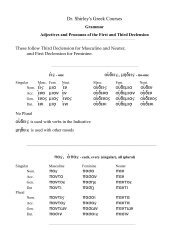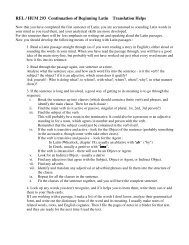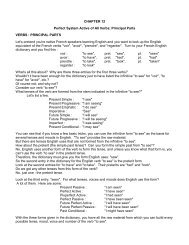Formation of the Perfect Stems: Why are they so unusual?
Formation of the Perfect Stems: Why are they so unusual?
Formation of the Perfect Stems: Why are they so unusual?
You also want an ePaper? Increase the reach of your titles
YUMPU automatically turns print PDFs into web optimized ePapers that Google loves.
<strong>Formation</strong> <strong>of</strong> <strong>the</strong> <strong>Perfect</strong> <strong>Stems</strong>: <strong>Why</strong> <strong>are</strong> <strong>the</strong>y <strong>so</strong> <strong>unusual</strong>? - Textkit Greek and Latin Lear...<br />
examples:<br />
audio, audire, audivi, auditum<br />
finio, finire, finivi, finitum<br />
exception:<br />
sentio, sentire, sensi, sensum<br />
your grammar/text may differ in <strong>the</strong> gender <strong>of</strong> <strong>the</strong> perfect passive or "fourth principle part" but <strong>the</strong><br />
gender is really irrelevant in this context.<br />
The first conjugation is <strong>the</strong> only class that is actually considered to have a regular paradigm, but with <strong>the</strong><br />
second and fourth, you will find that those listed as examples <strong>are</strong> by far <strong>the</strong> most commonly occurring<br />
forms. As you can see, <strong>the</strong> Third Conjugation really is full <strong>of</strong> irregularity in its perfect tense forms,<br />
except in that it will still always end in those certain sets <strong>of</strong> letters, as do all <strong>of</strong> <strong>the</strong> o<strong>the</strong>r conjugations.<br />
Therefore, this tutorial will mainly focus on how <strong>the</strong> Third Conjugation's perfect stem is formed.<br />
Understanding <strong>Why</strong> <strong>the</strong> Sounds Change: Part I<br />
There <strong>are</strong> very many rea<strong>so</strong>ns why a letter and <strong>the</strong> <strong>so</strong>und which it represents can mutate into <strong>so</strong>mething<br />
that seems completely foreign. These abnormalities occur in every word <strong>of</strong> <strong>the</strong> Third Conjugation, and<br />
occasionally in <strong>the</strong> o<strong>the</strong>r conjugations.<br />
The most drastic mutation, but al<strong>so</strong> a very r<strong>are</strong> one is suppletion, <strong>the</strong> collision <strong>of</strong> words. This is <strong>the</strong> case<br />
with just a handful <strong>of</strong> words, such as "tollo, tollere, sustuli, sublatum" in which half <strong>of</strong> <strong>the</strong> principle parts<br />
look completely alien to <strong>the</strong> o<strong>the</strong>r half. This is not by mere chance, but it is because two words which<br />
evolved separately from one ano<strong>the</strong>r have fused into one very strange word. It may not seem like such a<br />
strange thing for words to do when we realize that <strong>so</strong>me <strong>of</strong> our words, such as "go / went / gone" and<br />
"be / am / <strong>are</strong> / is / was / were / been" (that was a mouthful), <strong>are</strong> even more severe cases <strong>of</strong> this<br />
phenomenon.<br />
One <strong>of</strong> <strong>the</strong> more common types <strong>of</strong> change is <strong>the</strong> weakening <strong>of</strong> con<strong>so</strong>nants. It is very hard to pronounce a<br />
G correctly when we place it before certain letters such as T or S. Try saying "agtum" quickly and you<br />
will find that <strong>the</strong> natural inclination is to say <strong>so</strong>mething closer to "actum", which is <strong>the</strong> word that <strong>the</strong><br />
Romans preferred as well. So, with <strong>the</strong> word "ago, agere", we take <strong>the</strong> stem <strong>of</strong> <strong>the</strong> word ("ag-") and<br />
juxtapose <strong>the</strong> perfect passive ending (-tum), and receive <strong>the</strong> much fe<strong>are</strong>d "agtum"; we <strong>the</strong>n weaken <strong>the</strong><br />
G to a C and all becomes peaceful once again. You can observe this <strong>so</strong>rt <strong>of</strong> change quite <strong>of</strong>ten in verbs<br />
(and al<strong>so</strong> nouns and compound words), such as "rego, regere": we take "reg-" and add "-tum" which<br />
gives us "regtum", but we do not like this <strong>so</strong> we turn it into "rectum", which is indeed <strong>the</strong> fourth<br />
principle part <strong>of</strong> "rego, regere, rexi, rectum". This same exact rule applies to many o<strong>the</strong>r verbs, such as<br />
"intellego, intellegere" (see if you can guess what <strong>the</strong> fourth part will be if you don't already know).<br />
This is <strong>the</strong> way that con<strong>so</strong>nants <strong>are</strong> usually weakened in Latin:<br />
G becomes C<br />
D becomes T<br />
B becomes P<br />
Page 2 <strong>of</strong> 5<br />
"Scribo, scribere, scripsi, scriptum" is a perfect example <strong>of</strong> how <strong>the</strong> stem ending in B becomes P before<br />
certain con<strong>so</strong>nants.<br />
http://www.textkit.com/tutorials/20030923print.html<br />
9/25/03







